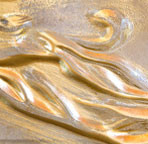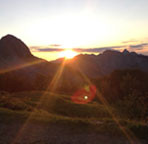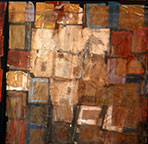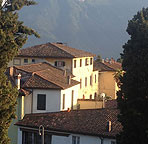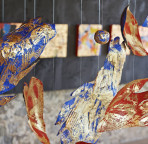“Even the careless curve of a frozen cloud across the blue will calm some troubled thoughts, may slay some selfish thoughts. And what shall be said of such gorgeous shows as the scarlet poppies in the green corn, the likest we have to those lilies of the field which spoke to the Savior himself of the care of God, and rejoiced His eyes with the glory of their God-devised array? From such visions as these the imagination reaps the best fruits of the earth . . . ”
—George MacDonald, A Dish Of Orts*
*’Orts’ is a Scottish word meaning a scrap or morsel of food left at a meal.
George MacDonald, (1824–1905), wrote about literature, inspiration, and the human imagination. He considered the question of where the human imagination originates: “But, as to this matter of creation, is there, after all, I ask yet, any genuine sense in which a man may be said to create his own thought-forms?” MacDonald sights John Ruskin’s opinion that men and women are not the independent originators of their own creative imaginations: “Allowing that a new combination of forms already existing might be called creation, is the man, after all, the author of this new combination? Did he, with his will and his knowledge, proceed wittingly, consciously, to construct a form which should embody his thought? Or did this form arise within him without will or effort of his—vivid if not clear—certain if not outlined? Ruskin (and better authority we do not know) will assert the latter, and we think he is right: though perhaps he would insist more upon the absolute perfection of the vision than we are quite prepared to do. Such embodiments are not the result of the man’s intention, or of the operation of his conscious nature. His feeling is that they are given to him; that from the vast unknown, where time and space are not, they suddenly appear in luminous writing upon the wall of his consciousness.”
Pursuing this thought, he continues, “Can it be correct, then, to say that he created them? Nothing less so, as it seems to us. But can we not say that they are the creation of the unconscious portion of his nature? Yes, provided we can understand that that which is the individual, the man, can know, and not know that it knows, can create and yet be ignorant that virtue has gone out of it. From that unknown region we grant they come, but not by its own blind working. Nor, even were it so, could any amount of such production, where no will was concerned, be dignified with the name of creation. But God sits in that chamber of our being in which the candle of our consciousness goes out in darkness, and sends forth from thence wonderful gifts into the light of that understanding which is His candle. Our hope lies in no most perfect mechanism even of the spirit, but in the Wisdom wherein we live and move and have our being. Thence we hope for endless forms of beauty informed of truth. If the dark portion of our own being were the origin of our imaginations, we might well fear the apparition of such monsters as would be generated in the sickness of a decay which could never feel—only declare—a slow return towards primeval chaos. But the Maker is our Light.”
“One word more, ( . . . ) did we not see a something in God for which we would humbly keep our mighty word—the fact that there is always more in a work of art—which is the highest human result of the embodying imagination—than the producer himself perceived while he produced it, seems to us a strong reason for attributing to it a larger origin than the man alone‚—for saying at the last, that the inspiration of the Almighty shaped its ends.”
Comments welcome.

